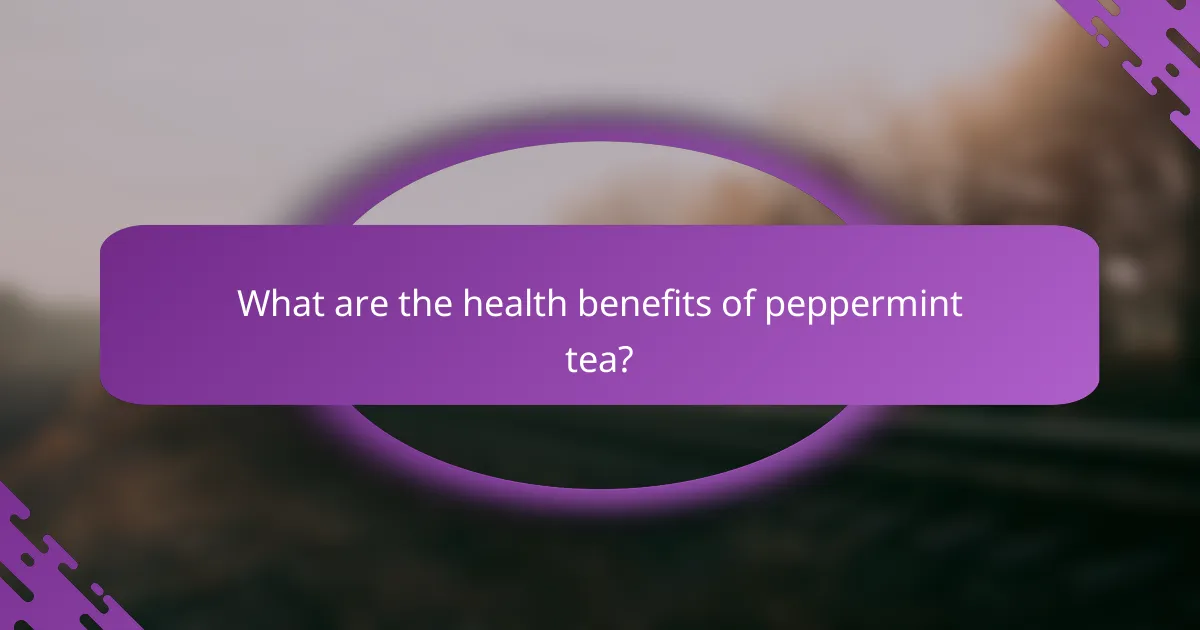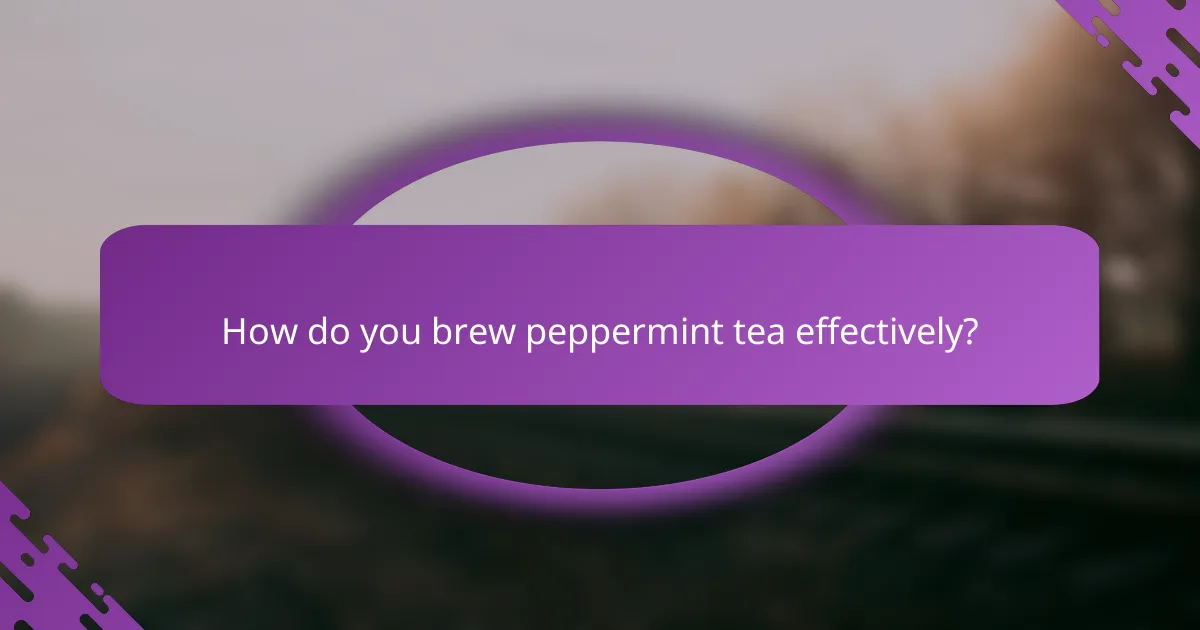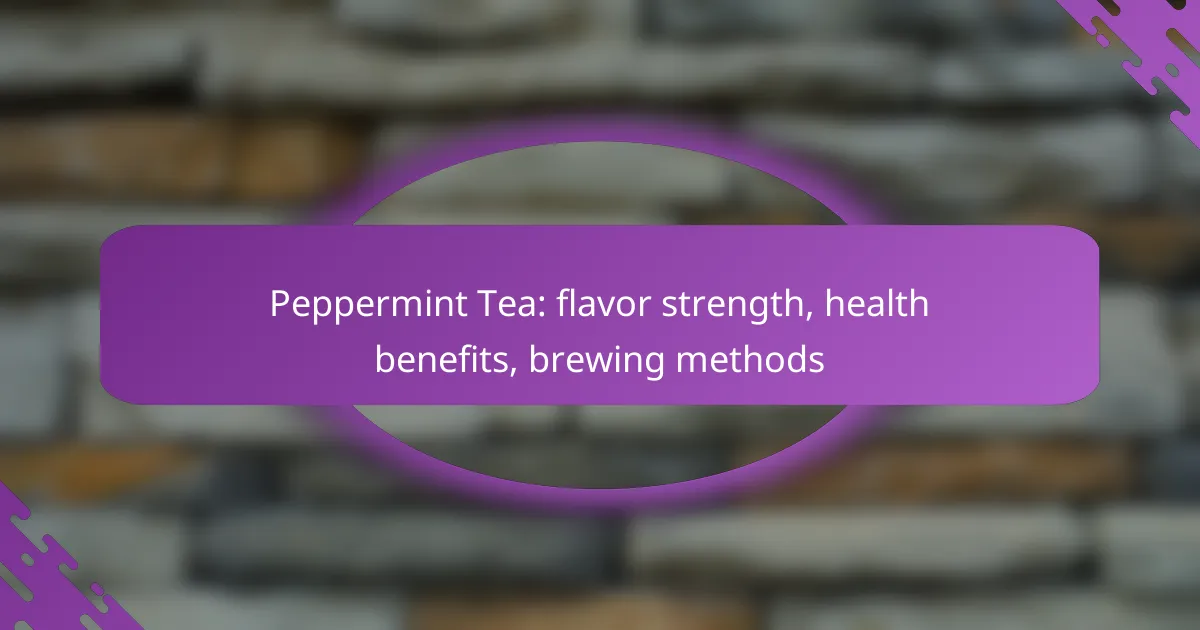Peppermint tea is known for its refreshing flavor, which can vary in strength depending on the type of peppermint, brewing time, and water temperature. Beyond its delightful taste, this herbal infusion offers numerous health benefits, including support for digestion and enhanced mental clarity. To brew the perfect cup, it’s essential to use fresh peppermint leaves or quality tea bags, along with the appropriate water temperature and steeping time.

How does peppermint tea’s flavor strength vary?
Peppermint tea’s flavor strength can vary significantly based on factors such as the type of peppermint used, the brewing time, and the water temperature. Generally, a stronger brew is achieved with higher tea concentrations and longer steeping times.
Flavor profile of peppermint tea
Peppermint tea is known for its refreshing and invigorating flavor, characterized by a cool, minty taste with subtle sweetness. The flavor can range from mild to intense, depending on the preparation method and the specific variety of peppermint used.
The aroma of peppermint tea is equally important, often described as uplifting and soothing, which enhances the overall drinking experience. This aromatic quality contributes to its popularity as a herbal remedy for various ailments.
Factors affecting flavor strength
Several factors influence the flavor strength of peppermint tea, including the leaf quality, the amount of tea used, and the steeping conditions. Fresh peppermint leaves tend to produce a more robust flavor compared to dried leaves.
Brewing temperature is crucial; water that is too hot can lead to a bitter taste, while cooler water may not extract enough flavor. A typical brewing temperature ranges from 90°C to 100°C (194°F to 212°F), with steeping times of 5 to 10 minutes recommended for optimal flavor extraction.
Comparison with other herbal teas
Peppermint tea’s flavor strength is often stronger than many other herbal teas, such as chamomile or rooibos, which tend to have milder profiles. While chamomile offers a floral and soothing taste, peppermint provides a more pronounced and invigorating minty flavor.
In contrast to herbal teas like hibiscus, which can be tart, peppermint maintains a consistent coolness that appeals to many tea drinkers. This distinct flavor makes peppermint tea a popular choice for those seeking a refreshing beverage, especially in warmer climates.

What are the health benefits of peppermint tea?
Peppermint tea offers several health benefits, primarily due to its active compounds like menthol. Regular consumption can support digestive health, enhance mental clarity, and may provide anti-inflammatory effects.
Digestive health benefits
Peppermint tea is well-known for its ability to soothe digestive issues. It can help relieve symptoms of indigestion, bloating, and gas by relaxing the muscles of the gastrointestinal tract.
For optimal effects, drinking peppermint tea after meals can be beneficial. Aim for one to two cups, allowing the menthol to aid digestion and promote a sense of comfort.
Effects on mental clarity
Peppermint tea may enhance mental clarity and concentration. The aroma of peppermint has been shown to stimulate the brain, potentially improving focus and alertness.
Incorporating peppermint tea into your routine, especially during study sessions or work hours, can help maintain cognitive performance. A cup in the morning or during breaks can provide a refreshing boost.
Potential anti-inflammatory properties
The anti-inflammatory properties of peppermint tea may help alleviate symptoms of conditions like headaches and muscle pain. Menthol, a key component, can act as a natural analgesic.
While more research is needed, drinking peppermint tea regularly may contribute to overall wellness. Consider it as a soothing option for managing mild discomfort or inflammation.

How do you brew peppermint tea effectively?
To brew peppermint tea effectively, start with fresh peppermint leaves or high-quality tea bags, and ensure you use the right water temperature and brewing time. This will help you achieve a flavorful and aromatic cup that maximizes the tea’s health benefits.
Recommended brewing methods
There are several effective methods for brewing peppermint tea, including steeping loose leaves, using tea bags, or employing a French press. For loose leaves, a typical ratio is about one teaspoon of dried leaves per cup of water. If using a tea bag, one bag per cup is sufficient.
For a stronger flavor, consider cold brewing by steeping the leaves in cold water for several hours in the refrigerator. This method extracts a different profile of flavors and can be refreshing during warmer months.
Optimal water temperature
The optimal water temperature for brewing peppermint tea is around 90-95°C (194-203°F). Using water that is too hot can lead to a bitter taste, while cooler water may not extract the full flavor. Always allow the water to reach the desired temperature before pouring it over the tea.
If you don’t have a thermometer, a good rule of thumb is to bring the water to a boil and then let it sit for about 30 seconds to cool slightly before pouring.
Brewing time for best flavor
The ideal brewing time for peppermint tea is typically 5-7 minutes. This duration allows the leaves to release their essential oils and flavors fully. If you prefer a milder taste, you can reduce the brewing time to about 3-4 minutes.
Be cautious not to over-brew, as this can result in a more bitter flavor. If using a French press, you can press the leaves after the desired brewing time to stop the extraction process.

What are the best peppermint tea brands available in the UK?
Some of the best peppermint tea brands in the UK include Twinings, Pukka, and Yorkshire Tea, known for their quality and flavor. These brands offer a range of peppermint tea options that cater to different preferences and health considerations.
Popular brands and their offerings
Twinings is a well-established brand that offers a classic peppermint tea, known for its refreshing taste and aroma. Pukka provides a variety of organic peppermint blends, often combined with other herbs for added flavor and health benefits. Yorkshire Tea also has a peppermint infusion that is praised for its strong flavor and quality ingredients.
Other notable brands include Clipper, which focuses on organic and fair trade options, and Teapigs, known for its premium quality tea bags that deliver a robust peppermint flavor. Each brand has its unique selling points, making it essential to explore different options to find your preferred taste.
Organic vs non-organic options
Organic peppermint tea is made from leaves grown without synthetic pesticides or fertilizers, which may appeal to health-conscious consumers. These teas often have a fresher taste and are better for the environment. Non-organic options, while typically less expensive, may contain residues from agricultural chemicals.
When choosing between organic and non-organic peppermint tea, consider your priorities regarding health and environmental impact. Organic teas can be found at various price points, usually ranging from £2 to £5 for a box, while non-organic varieties may be slightly cheaper. Always check for certifications to ensure you’re getting a genuine organic product.

How does peppermint tea compare to other herbal teas?
Peppermint tea stands out among herbal teas due to its distinct flavor profile and unique health benefits. While many herbal teas offer soothing properties, peppermint tea is particularly known for its refreshing taste and digestive support, making it a popular choice for many tea drinkers.
Flavor comparisons with chamomile tea
Peppermint tea is characterized by its strong, minty flavor, which can be invigorating and cooling. In contrast, chamomile tea has a gentle, floral taste that is often described as calming and soothing. The boldness of peppermint makes it a great choice for those seeking a more robust flavor, while chamomile is ideal for relaxation.
When brewed, peppermint tea typically has a sharper taste that can linger on the palate, whereas chamomile offers a softer finish. This difference in flavor strength can influence personal preference depending on the occasion, such as a refreshing drink during the day versus a calming beverage before bedtime.
Health benefits compared to ginger tea
Peppermint tea is well-known for its ability to aid digestion and relieve headaches, thanks to its menthol content. Ginger tea, on the other hand, is celebrated for its anti-inflammatory properties and effectiveness in alleviating nausea. Both teas provide unique health benefits, making them suitable for different health needs.
While peppermint tea can help soothe an upset stomach and reduce bloating, ginger tea is often recommended for its warming effects and ability to support the immune system. Choosing between the two may depend on whether you are looking for digestive relief or a boost in overall wellness.

What are the potential side effects of peppermint tea?
Peppermint tea is generally safe for most people, but it can cause some side effects in certain individuals. Common issues include digestive discomfort and allergic reactions, particularly in those sensitive to mint or related plants.
Common side effects
The most frequently reported side effects of peppermint tea include heartburn, nausea, and digestive upset. These symptoms often arise when consumed in large quantities or on an empty stomach. If you experience discomfort, consider reducing your intake or consuming it with food.
Some individuals may also experience allergic reactions, which can manifest as skin rashes or respiratory issues. If you notice any adverse effects after drinking peppermint tea, discontinue use and consult a healthcare professional.
Interactions with medications
Peppermint tea can interact with certain medications, particularly those for acid reflux and digestive disorders. It may exacerbate the effects of antacids or proton pump inhibitors, leading to increased side effects or reduced efficacy.
If you are taking medications for heartburn, diabetes, or blood pressure, consult your healthcare provider before incorporating peppermint tea into your routine. They can help determine if it is safe based on your specific health needs and medication regimen.
